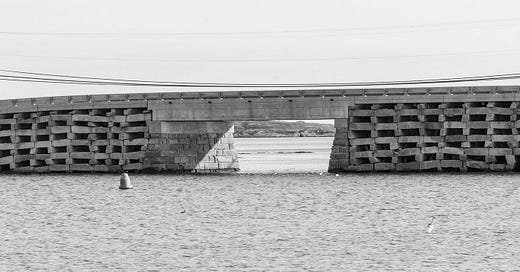Maine’s Bailey Island is part of the town of Harpswell, and it’s known for a lot of things. Carl Jung gave his first American lecture at the Bailey Island Library Hall in 1936. Bailey island is also the home of the only cribstone bridge in the world, a cobwork design built in 1928 to withstand rough tides. The bridge connects Bailey Island to neighboring Orr’s Island over a body of water called Will’s Gut. But the most compelling story about Bailey Island starts about 80 miles away in Shapleigh, Maine… Well, really it starts more than a century before the town’s founding with death of its namesake, Nicholas Shapleigh.
Born wealthy in England, Shapleigh arrived in the Province of Maine around 1644. He was so rich that the town of Kittery was named after his family’s estate of Kittery Quay, in Kingswear, Devon. Naturally, a few years after his arrival in Maine, he was appointed provincial treasurer and made major in command of the Maine militia. Shapleigh put his family money to use, building a gristmill and sawmill, increasing his family’s already unspeakable wealth. Of course, much of the actual labor was done by the Black people Shapleigh had enslaved, at least one of whom was a child when Nicholas abducted him from Africa.
In April of 1682, while watching a boat launch, the vessel’s mast broke off and knocked Nicholas in his head, killing him. He’d left his fortune—including the enslaved Africans—to his nephew John Shapleigh. One of these inherited enslaved people, abducted by Nicholas as a child, was Will. The townsfolk called him “Black Will” because of course they did and he caused a little bit of trouble. Will had a child with Alice Hanscom, a white woman and because interracial marriages were illegal, their child, Will Jr., became the ward of the town. But, in the year 1700, after 18 years providing free labor for the Shapleighs, Will was freed. This probably had something to do with John not wanting to financially support Will Jr., who was now ten years old.
In freedom, Will made big moves. He changed his name to Will Black. He’d already bought 100 acres in what is now Eliot, Maine for £25 he managed to save from working jobs off the Shapleigh plantation. Will established a farmstead. He struck a deal with a local enslaver, trading two of his acres for the freedom of his friend Tony, who soon changed his name to Anthony Freeman. Through acts like this, Will turned his farmstead into Maine’s first Black community.
Like his father, Will Jr. also made big moves. He bought land in Berwick and in 1714 he fell in love. Her name was Elizabeth Turbet and she was white. Again, interracial marriages were illegal, so when word spread about their relationship, Will Jr. was jailed and the local judge blocked their marriage. A few years later, when Elizabeth gave birth to Will Black III, the town again lost their shit. There’s no available record of Will Jr.’s punishment, but Elizabeth received 20 lashes and Will probably got the same, at least.
It wasn’t long after when Will Jr. took his family up the coast. Unlike the white settlers, Will Jr. established a good relationship with local tribes and he and his family settled on the island Capenawagen. That island that soon came to be known as Will’s Island and it was probably pretty nice to be away from the racist white power structures. But colonizers are, well, colonizers and Will Jr. wasn’t quite done putting up with their bullshit.
William Dudley was a former member of the Massachusetts House of Representatives, the nepo baby son of a former governor and he wanted Will’s Island real bad. Dudley went to the Committee for Resettlement and literally asked to be given “the island upon which Black Will lives”. But something went wrong somewhere along the transaction and Dudley ended up with Haskell Island instead. Undeterred and greedy as all Hell, Dudley then went back to the committee and asked in particular for, “the island wheron said Black Will doth reside, commonly called Capenawagen”. Without any say from Will Jr., Dudley got a deed to the island, but died before setting foot on what remained as Will’s Island.
Will Jr. died rich of old age in 1762 and was buried alongside his wife on Will’s Island. At some point the island came into the possession of Deacon Timothy Bailey, after whom it’s currently named. But under that singular cribstone bridge connecting Bailey and Orr’s Islands lies a body of water, a strait called Will’s Gut, named after the original son of Maine’s first Black community.
This article was first published in my Racisms column in this month’s edition of The Bollard, that has a real nice Substack right here!
https://dn790000.ca.archive.org/0/items/historyofbrunswi01whee/historyofbrunswi01whee.pdf
https://harpswellanchor.org/2022/06/whats-in-a-name-the-truth-about-black-will-and-bailey-island/
https://valiquo.medium.com/psychoanalysts-to-cribstone-a-look-at-a-small-maine-island-3be56ace4069
https://www.pbs.org/wgbh/pages/frontline/shows/secret/famous/black.html





